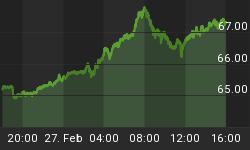The U.S. stock market has held up remarkably well in recent weeks, despite surging commodities and precious metals prices, bond yields hitting new 4-year highs, a shaky dollar, mixed economic data, and a downward spiral in presidential approval ratings.
Not to mention a less-than-stellar outlook from corporate America, just as another earnings season gets under way.
For the optimists, that suggests the market is still in a bullish, climb-the-wall-of-worry mode. Which means, in their eyes at least, that share prices will invariably move higher, signaling that things remain on a positive track, despite current developments.
Many seasoned observers, meanwhile, are scratching their heads, wondering just what they are missing. Especially in light of the fact that technical and seasonal factors remain unsupportive at best, the U.S. real estate bubble seems to be bursting, and the three-year old rally is looking very tired.
Perhaps the bulls are right, and the pessimists need to wake up to a new reality. One where they can move past their fears and join with those in the majority who are betting on an inevitable further rise in share prices that will be a precursor of still more good times to come.
Then again, maybe the rose-colored-glasses set are wrong. Maybe what we are seeing now, in fact, are the early signs of something altogether different from what we have experienced before.
The kind of thing that sclerotic, poorly-led, overleveraged, and often-corrupt "lesser-developed" nations have gone through -- over and over again.
In other words, an economic and financial crisis, where the home currency plunges, interest rates surge into the double-digits, and the cost of energy, basic commodities, and a wide range of goods and services goes through the roof.
And, curiously enough, where share prices -- especially those of export-sensitive companies -- often soar to dizzying heights, albeit in nominal terms, as beleaguered investors seek some sort of shelter from the ravages of inflation and foreign-exchange-related chaos.
A situation that is largely familiar to those who live in places like Brazil, Argentina, Turkey and Zimbabwe. But not -- up to now, at least -- those who are from America.
Indeed, rather than being viewed as a cause for optimism and evidence of future economic vitality, rising stock prices in circumstances where the current account deficit is 7% of GDP, where total debt is three times output, and where there is xenophobic talk of tariffs and walled borders, may, in fact, represent something else.
Namely, the desperation of those who fear being left impoverished by the economic bunker-buster that such imbalances have inflicted on similarly-situated nations in the past.
In other words, those betting that U.S. equity prices will move considerably higher in the period ahead should be careful what they wish for.















